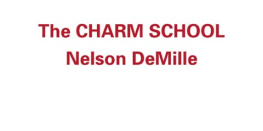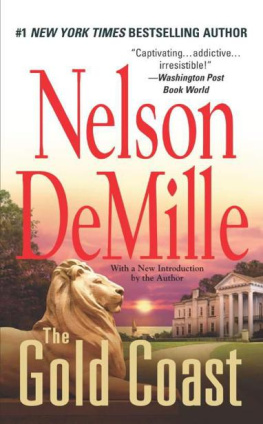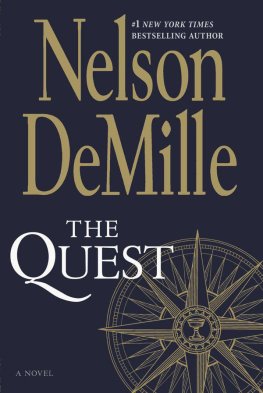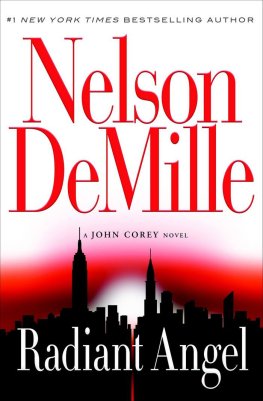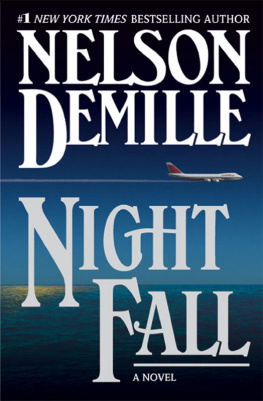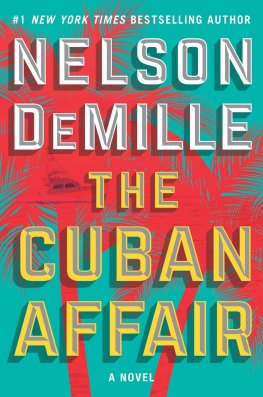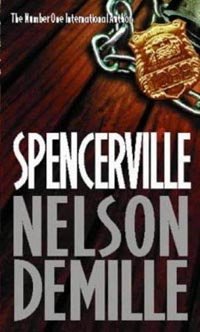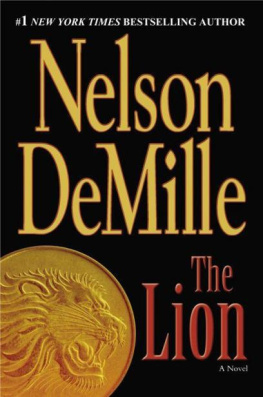Nelson DeMille - Death Benefits
Here you can read online Nelson DeMille - Death Benefits full text of the book (entire story) in english for free. Download pdf and epub, get meaning, cover and reviews about this ebook. genre: Detective and thriller. Description of the work, (preface) as well as reviews are available. Best literature library LitArk.com created for fans of good reading and offers a wide selection of genres:
Romance novel
Science fiction
Adventure
Detective
Science
History
Home and family
Prose
Art
Politics
Computer
Non-fiction
Religion
Business
Children
Humor
Choose a favorite category and find really read worthwhile books. Enjoy immersion in the world of imagination, feel the emotions of the characters or learn something new for yourself, make an fascinating discovery.

- Book:Death Benefits
- Author:
- Genre:
- Rating:4 / 5
- Favourites:Add to favourites
- Your mark:
- 80
- 1
- 2
- 3
- 4
- 5
Death Benefits: summary, description and annotation
We offer to read an annotation, description, summary or preface (depends on what the author of the book "Death Benefits" wrote himself). If you haven't found the necessary information about the book — write in the comments, we will try to find it.
Death Benefits — read online for free the complete book (whole text) full work
Below is the text of the book, divided by pages. System saving the place of the last page read, allows you to conveniently read the book "Death Benefits" online for free, without having to search again every time where you left off. Put a bookmark, and you can go to the page where you finished reading at any time.
Font size:
Interval:
Bookmark:
Nelson DeMille
Death Benefits
On a pleasant Friday afternoon in June, best-selling author Jack Henry sat in the study of his Upper East Side townhouse. He had put his creative writing aside and was now focused on his finances-bills, income projections, royalty statements, and pending deals.
After a few hours, he was coming to the realization that he was on the brink of insolvency. Bankruptcy. Holy shit.
It just didnt seem possible. He was rich and famous. How could he be broke?
Well, because the money going out was greater than the money coming in. Thats how. Actually, hed known about this problem for some time. But through a process of denial, disbelief, and maybe a little arrogance, hed put off the inevitable conclusion, which now stared him in the face. Youre broke, he said aloud. You have no money. Youre screwed.
He opened the lower left drawer of his desk, pulled out a bottle of Remy Martin, and took a swig.
He sat back in his leather chair and stared blankly out the window of his East Sixty-fourth Street townhouse. How did this happen? Well, two financially ruinous divorces had not helped the bottom line. Not to mention that his last two novels hadnt been well received by the critics or the public and had also been turned down by the book clubs. And then there were the movie deals that had never materialized, and the foreign translation deals on his last two books that had dwindled to a few lowball offers from thieving publishers in countries that he couldnt even locate on a map. Lithuania? His agent, Stan Wykoff, wanted him to accept any translation deal, like the thousand bucks just offered by the Bulgarian publisher for his latest novel, Into the Dark Waters. Stan had told him, Ill see if I can get you a paid trip to Bulgaria to publicize the book. To which Jack had replied, You go to Bulgaria. See if you can get me another thousand.
Jack took a second swig of cognac. How are the mighty fallen.
His biggest financial problem seemed to be taxes-federal, New York State, and New York City. A letter from his accountant informed him that his tax obligations-past, present, and future-totaled slightly over half a million dollars with interest and penalties. How did that happen? Well, apparently hed made enough money to owe taxes, but hed been spending his gross income as it came in and had not set aside money for his government partners. That wasnt too smart, but he didnt believe hed been too extravagant in his spending except of course he had high fixed and necessary expenses, like the two top floors of this townhouse, which cost him ten thousand a month. Then there was his secretary and his housekeeper. And, of course, there was the summer rental in East Hampton at how much was that? He found the entry in his checkbook. One hundred and forty thousand for the season. Maybe he should have spent this summer in the city. But how could he do that? Everyone was in the Hamptons.
Then there were his incidental expenses like the catered dinner parties; the BMW lease; his club, the Knickerbocker; his clothes; dining out; and a few vacations. Paris in the fall, for instance. St. Barths in January. A few bucks here and a few bucks there, and before you know it, it adds up.
And on top of all this were his necessary business expenses. Typewriter paper. Printer cartridges. Lots of paper clips. Plus a new dictionary. It adds up.
The problem, he was convinced, was not the expenses-hed always had these expenses. The problem was the income. Expenses were steady; income was down. That was the problem. That was what had led to this alarming gap in his cash flow chart. Or whatever his accountant called it.
And was this declining income his fault? No. It was the fault of his publisher, who couldnt sell crack cocaine to a junkie. And they damned sure couldnt sell books. Not his books, anyway.
The other reason for this income crisis was Stan Wykoff. Laziest literary agent on the planet. And for doing nothing, Stan took 15 percent of everything that Jack made, which, admittedly, had not been as much in the last few years as it had once been. Yet there had been a time when Jack Henry pulled in two or three million a year, and Stan Wykoff skimmed his 15 percent right off the top. How much, Jack wondered, had Stan made off him in the last ten or twelve years? Jack did a quick calculation in his head and came up with about three million dollars. Bastard.
If Jack thought that Stan Wykoff was sharing in his financial distress, he would have taken some satisfaction in that. But the Wykoff Agency had dozens of authors who Stan ripped off at 15 percent, and as long as half of them produced, then Stan could actually live better than his highest-paid author. For doing nothing.
Jack Henry looked at his watch. It was close to 4 P.M., and he wanted to get on the road and drive out to his summer rental. He needed a break from this depressing reality and a break from his writing, which was not going well. He needed to sit on his back deck and stare at the sun setting over Georgica Pond, a drink in his hand, and his mind on something else. Like fishing or getting a tan. Or the new cocktail waitress at The Palm.
Something would turn up that would get him out of this predicament. It always did.
As he tidied up his desk, he came across a bill that his secretary had marked Important. It was an annual premium notice from the National Life Insurance Company. Five thousand two hundred and thirty dollars. It took him a few seconds to recognize what this was. It was, in fact, the bill for a policy that he had taken out on the life of Stan Wykoff. The death benefit was five million dollars and the beneficiary was Jack Henry.
Jack stared at the premium notice, recalling better days when he was doing well financially and he and Stan had a substantial insurable interest in each others lives. Stan, he knew, had a similar policy on him. In fact, he recalled, they had taken their insurance physicals together, then gone out for drinks and later playfully pretended to push each other in front of moving vehicles. He smiled; then the smile faded as he thought about Stan getting his premium notice and paying it without a second thought or a second notice.
As for their present insurable interest in each other, Stan would not suffer a significant loss of income if Jack died, so the five million was all gravy for him. And if Stan died well, Jacks income would go up. Five million. And Stan, who had seemed so irreplaceable when the policy was taken out, was now easily replaceable. In fact, Jack would have a new agent before the embalmers finished with Stan Wykoff.
Meanwhile, however, this was a term policy and the premiums were rising faster than Jacks and Stans ages. And Stan, with nothing to do all day, went to the gym a lot and kept fit. Jack on the other hand was tied to his desk sixty hours a week, and perhaps he drank too much. In fact, he realized that Stan had a much better chance than he did of cashing in on the five million dollars.
Bottom line here, he thought, this is a good place to save some money. He threw the premium notice in the wastebasket, stood, and walked toward the door.
He stopped. Then turned, walked back to the wastebasket, and retrieved the bill. Five thousand two hundred and thirty dollars. Thats what it would cost him to make five million if Stan died in the next twelve months. But what if Stan didnt die? Why would Stan die? How would Stan die?
Jack stared at the bill. His lottery ticket. The solution to all his money problems was pressed between his thumb and index finger. Stan was healthy but even healthy people had accidents.
Jack came to his senses, then laughed silently at the crazy thought that had formed in his mind. This isnt a novel by Jack Henry. This is real life. Real people dont murder people for insurance money. Actually, they did. Desperate men do desperate things. But he wasnt a murderer. He was a financial idiot, but not a killer. He threw the premium notice back in the wastebasket and left his office.
Font size:
Interval:
Bookmark:
Similar books «Death Benefits»
Look at similar books to Death Benefits. We have selected literature similar in name and meaning in the hope of providing readers with more options to find new, interesting, not yet read works.
Discussion, reviews of the book Death Benefits and just readers' own opinions. Leave your comments, write what you think about the work, its meaning or the main characters. Specify what exactly you liked and what you didn't like, and why you think so.

